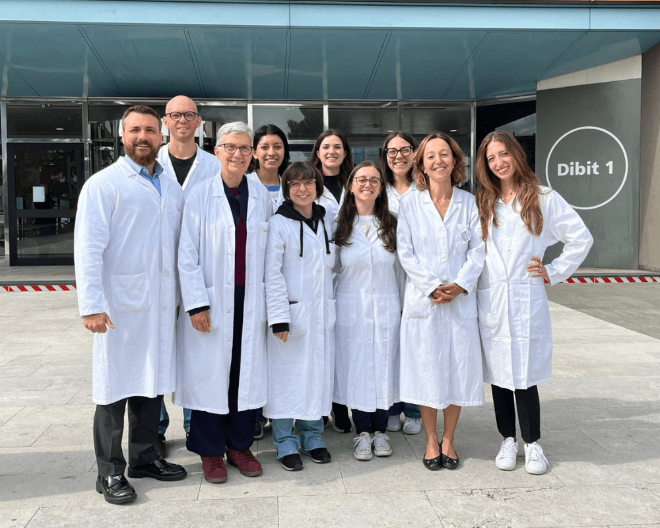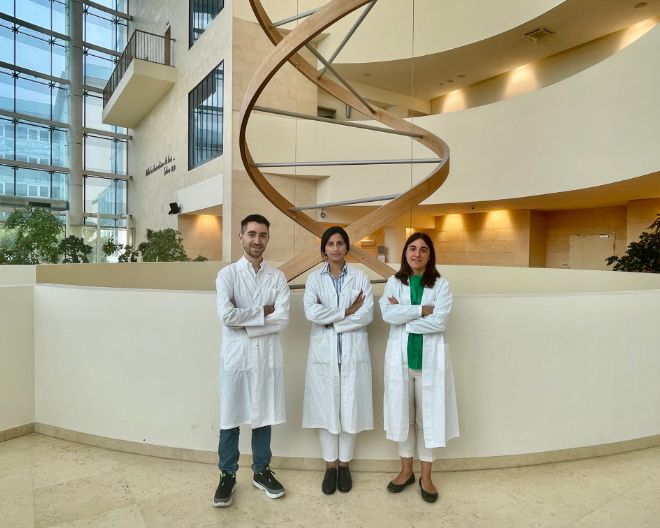0/resolutions/res-l992x10000/Test_salivare_tumore_cavo_orale_UniSR-(1)0.png)
A new salivary test developed by the spin-off of the Alma Mater Studiorum - University of Bologna Studium Genetics has been introduced
A simple saliva test could revolutionize the early diagnosis of oral cancer, not only by identifying them promptly, but also with absolute precision. The discovery is the result of research conducted by Studium Genetics, a spin-off of the Alma Mater Studiorum - University of Bologna, which has chosen San Raffaele as a partner to introduce the new methodology into clinical practice and research. The new epigenetic test is based on the quantitative analysis of the DNA methylation level of 13 genes found to be altered in oral carcinomas, and allows for the early identification of patients at risk of developing oral squamous cell carcinoma (OSCC) and its precursor, severe dysplasia. It is a non-invasive technique capable of providing diagnostic, prognostic and follow-up information, with a high degree of precision: in a multicenter study, published in the journal Head & Neck, a sensitivity of 97 percent and a specificity of 88 percent were achieved.
/resolutions/res-l1920x10000/Test_salivare_tumore_cavo_orale_UniSR-(1).jpg)
Biopsy for oral cancer screening
In current clinical practice, oral cancer screening is performed exclusively by visual inspection by specialists who, in the presence of suspicious lesions, invite patients to undergo a biopsy, which is essential for making a correct diagnosis. However, the same patient often refuses to undergo an invasive examination such as a biopsy, thus allowing possible disease to progress.
Moreover, OSCC (oral squamous cell carcinoma) is a condition that is not always easy to detect, especially if it is precancerous in nature.
How the new saliva test works
The test developed by Studium Genetics, which could revolutionize the diagnostics and treatment paradigm of this type of tumor, is quick and simple to perform: once the suspicious lesion has been identified, samples are collected from the oral mucosa (tongue, cheek, palate) via the simple passage of a special toothbrush equipped with bristles.
The sample is collected in a test tube and inserted into a storage solution that keeps it at room temperature, ensuring its stability over time and facilitating transport. The sample is then processed in reference laboratories:
- using sequencing protocols and bioinformatic analyses;
- quantifying the level of DNA methylation in the 13 disease-associated genes.
A calculation is then performed which, using a patented algorithm, generates a risk score for developing oral cancer.
For whom the test is suitable
The test is particularly useful for:
- people over the age of 40, who regularly consume alcohol or smoke;
- patients presenting with leukoplakia, erythroplakia, oral lichen planus, or any suspicious oral lesion.
Finally, the test represents an indispensable tool in the follow-up of patients previously treated for OSCC, as it is useful for identifying relapses, which are very frequent and increase the risk of death of these patients.
In any case, the indication for the actual use of this approach is left exclusively to the evaluation of the specialist.
/resolutions/res-l1920x10000/Test_salivare_tumore_cavo_orale_UniSR-(2).jpg)
The importance of early detection of oral squamous cell carcinoma
Oral squamous cell carcinoma is a major public health challenge, with over 745,000 cases reported worldwide and a 5-year mortality rate of approximately 60%. Additionally, the risk of recurrence after surgery, ranging from 17% to 30%, is higher than any other type of cancer and is the leading cause of death.
There are 4 stages of OSCC, from I to IV, which indicate its increasing severity.
“Stages I and II of oral squamous cell carcinoma normally have good survival compared to stages III and IV, which have a high recurrence rate and a mortality of 50% within 5 years. Unfortunately, 2/3 of cases are diagnosed at stage III and IV in an advanced stage, where demolitive and reconstructive surgery can have a severe impact on the anatomy, functionality, but also on the psyche.
The real challenge today is to be able to be very early in the diagnosis: the sooner we manage to intercept the tumor in the initial phase, the more the prognosis will not only be positive, but it will be possible to intervene in a less invasive way, without compromising the patient's quality of life. We are convinced that this revolutionary technology can help us overcome this challenge”
declare Prof. Giorgio Gastaldi, responsible for maxillofacial prosthetic rehabilitation in cancer patients together with Prof. Silvio Abati, head of Oral Medicine and Pathology, both UniSR Associate Professors of Odontostomatological diseases and belonging to the Department of Dentistry of the IRCCS Ospedale San Raffaele directed by Prof. Enrico Gherlone.
Future perspectives
“The partnership between our university, its spin-off Studium Genetics and IRCCS Ospedale San Raffaele, one of the reference centers in the diagnosis and treatment of cancer in the oral cavity, strengthens our bet on the identification of epigenetic modifications of the DNA methylation, as a new frontier of modern oncology medicine. We are confident that we have provided a fundamental tool to patients with oral cavity cancer, giving them a new concrete hope.
The prospect is to extend the collaboration to the Vita-Salute San Raffaele University, an institution of excellence in research on oral cavity pathologies"
concludes Professor Luca Morandi, associate of the Department of Biomedical and Neuromotor Sciences of the Alma Mater Studiorum-University of Bologna, developer of the test, which is operating in Europe and is being approved in the United States, China and Brazil.
You might be interested in

The EMA approves lecanemab

Juvenile Parkinson's disease: at San Raffaele created a new model to study its development

Researchers Franco, Ferrari and Omer awarded three ERC Starting Grants

